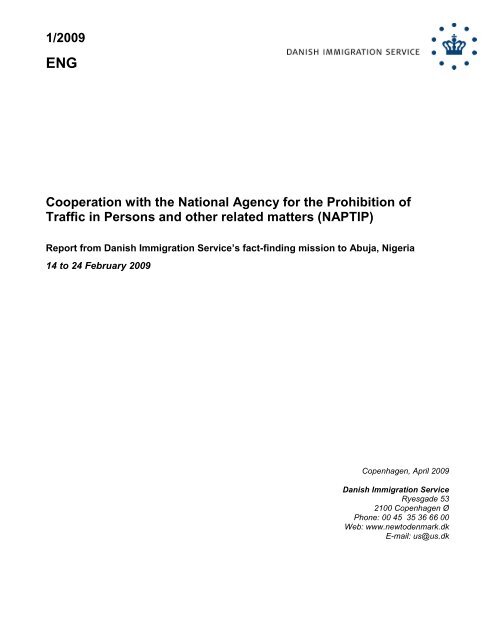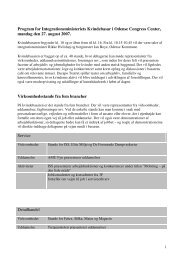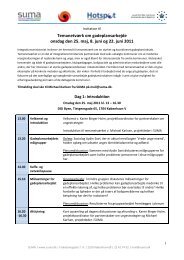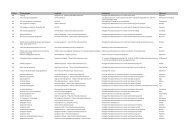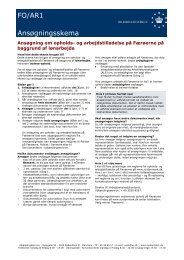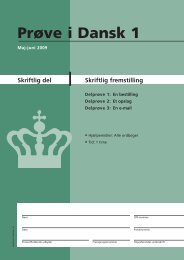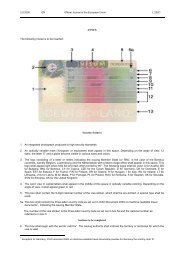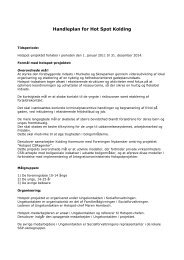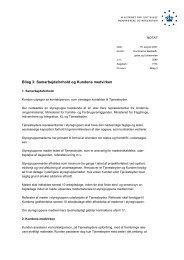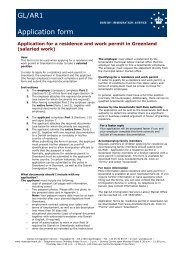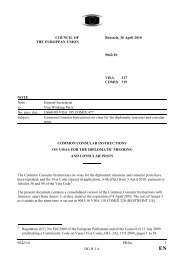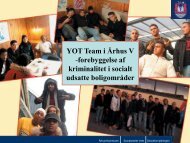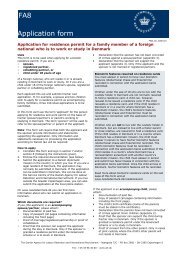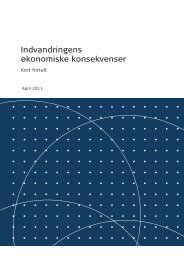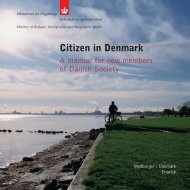Fact finding mission to Nigeria 2009 - Ny i Danmark
Fact finding mission to Nigeria 2009 - Ny i Danmark
Fact finding mission to Nigeria 2009 - Ny i Danmark
You also want an ePaper? Increase the reach of your titles
YUMPU automatically turns print PDFs into web optimized ePapers that Google loves.
1/<strong>2009</strong>ENGCooperation with the National Agency for the Prohibition ofTraffic in Persons and other related matters (NAPTIP)Report from Danish Immigration Service’s fact-<strong>finding</strong> <strong>mission</strong> <strong>to</strong> Abuja, <strong>Nigeria</strong>14 <strong>to</strong> 24 February <strong>2009</strong>Copenhagen, April <strong>2009</strong>Danish Immigration ServiceRyesgade 532100 Copenhagen ØPhone: 00 45 35 36 66 00Web: www.new<strong>to</strong>denmark.dkE-mail: us@us.dk
Overview of fact-<strong>finding</strong> reports published in 2008 and <strong>2009</strong>Protection of victims of trafficking in <strong>Nigeria</strong>, Report from Danish Immigration Service’s fact-<strong>finding</strong><strong>mission</strong> <strong>to</strong> Lagos, Benin City and Abuja, <strong>Nigeria</strong>, 9 – 26 September 20072008: 1Protection of victims of trafficking in Ghana, Report from Danish Immigration Service’s fact-<strong>finding</strong><strong>mission</strong> <strong>to</strong> Accra, Ghana. February 25 <strong>to</strong> March 6 20082008: 2Recruitment of IT specialists from India, An investigation of the market, experiences of Danish companies,the attitude of the Indian authorities <strong>to</strong>wards overseas recruitment along with the practices of other countriesin this field. Report from the fact <strong>finding</strong> <strong>mission</strong> <strong>to</strong> New Delhi and Bangalore, India4th <strong>to</strong> 14th May 20082008: 3Report of Joint British-Danish <strong>Fact</strong>-Finding Mission <strong>to</strong> Lagos and Abuja, <strong>Nigeria</strong>. 9 - 27 September 2007and 5 - 12 January 20082008: 4Cooperation with the National Agency for the Prohibition of Traffic in Persons and other related matters(NAPTIP). Report from Danish Immigration Service’s fact-<strong>finding</strong> <strong>mission</strong> <strong>to</strong> Abuja, <strong>Nigeria</strong>. 14 <strong>to</strong> 24February <strong>2009</strong><strong>2009</strong>: 1
ContentsIntroduction <strong>to</strong> the fact <strong>finding</strong> <strong>mission</strong> and the report ................................................................. 21. Western countries’ cooperation with NAPTIP ........................................................................... 42. Efforts <strong>to</strong> combat trafficking from <strong>Nigeria</strong> and IOMs cooperation with NAPTIP ................. 73. Comments on allegations that NAPTIP is involved in corruption, trafficking or othercriminal activities ............................................................................................................................... 94. NAPTIP’s travel activities ........................................................................................................... 185. Return of victims of trafficking from Western countries and cooperation with NAPTIP onreturns ............................................................................................................................................... 206. The resignation of the Executive Secretary of NAPTIP ........................................................... 22Consulted sources of information ................................................................................................... 24Abbreviations ................................................................................................................................... 25
National Agency for the Prohibition of Traffic in Persons and other related matters (NAPTIP)Introduction <strong>to</strong> the fact <strong>finding</strong> <strong>mission</strong> and the reportDanish Non-Governmental Organisations (NGOs) engaged in assistance <strong>to</strong> victims of trafficking inDenmark have alleged that the <strong>Nigeria</strong>n National Agency for the Prohibition of Traffic in Personsand other related matters (NAPTIP) is corrupted and involved in human trafficking as well ascollaborating with criminal groups in European countries. In addition <strong>to</strong> this an anonymous sourcehas claimed that the agency is undertaking such a level of international travel activities that itscapacity <strong>to</strong> assist victims of trafficking in <strong>Nigeria</strong> is accordingly being reduced.On the basis of the above mentioned allegations, and the fact that DIS’ most recent information onthe performance of NAPTIP was gathered in September 2007 1 the DIS decided <strong>to</strong> undertake a fact<strong>finding</strong> <strong>mission</strong> <strong>to</strong> <strong>Nigeria</strong>. The purpose of the <strong>mission</strong> was <strong>to</strong> gather updated and additionalinformation on the performance of NAPTIP and additional information on the agency’s cooperationwith Western countries and embassies, the International Organisation for Migration (IOM), theUnited Nations (UN) and local NGOs. The <strong>mission</strong> was undertaken from February 14 <strong>to</strong> 24 <strong>2009</strong>.In <strong>Nigeria</strong> the delegation consulted a number of Western embassies engaged in cooperation withNAPTIP, International Organisation for Migration (IOM), UN agencies and other anti-traffickingorganisations in <strong>Nigeria</strong> as well as NGOs and, at the very end of the <strong>mission</strong>, NAPTIP. The sourcesconsulted have an in-depth knowledge of NAPTIP’s activities and performance, as almost all ofthem are directly or indirectly cooperating with NAPTIP or acquainted with NAPTIP and its efforts<strong>to</strong> combat trafficking in humans. A list of sources consulted is attached <strong>to</strong> the report.It should be noted that no source consulted during the <strong>mission</strong> had information that NAPTIP’sperformance had deteriorated since the DIS under<strong>to</strong>ok its <strong>mission</strong> <strong>to</strong> <strong>Nigeria</strong> in September 2007. Onthe contrary most sources stated that NAPTIP’s performance had actually improved during the lastcouple of years.Because of the delicate matter of the accusations against NAPTIP all Western embassies chose <strong>to</strong>be referred <strong>to</strong> as “a Western embassy”. The same conditions applied for the UN organisations aswell as some NGOs. All interlocu<strong>to</strong>rs agreed that their statements could be included in the report athand. The complete identity of all sources consulted during the <strong>mission</strong> is known <strong>to</strong> the DIS.The sources consulted were informed that the report at hand would be a public document and havehad their statements presented in writing for approval before being included in<strong>to</strong> the report. Noother comments or statements have been included in the report except when a specific reference ismade <strong>to</strong> relevant public reports and articles.During the delegation’s stay in <strong>Nigeria</strong> the <strong>Nigeria</strong>n Government announced that it had accepted theresignation of the Executive Secretary of NAPTIP. The resignation <strong>to</strong>ok place on February 20 <strong>2009</strong>,and it came as surprise <strong>to</strong> all observers, including the leadership of NAPTIP. As a consequence ofthis sudden resignation the delegation decided <strong>to</strong> extend its stay in <strong>Nigeria</strong> for a few days in order <strong>to</strong>1 Danish Immigration Service: Protection of victims of trafficking in <strong>Nigeria</strong>, Report from Danish ImmigrationService´s fact-<strong>finding</strong> <strong>mission</strong> <strong>to</strong> Lagos, Benin City and Abuja, <strong>Nigeria</strong>, 9 <strong>to</strong> 26 September 2007, Copenhagen, April2008.2
National Agency for the Prohibition of Traffic in Persons and other related matters (NAPTIP)obtain further information on the reason behind the resignation. All additional informationregarding the resignation is included in this report.The DIS wishes <strong>to</strong> express its gratitude <strong>to</strong>wards the embassies/institutions/organisations andpersons in <strong>Nigeria</strong> that made the tasks of this fact <strong>finding</strong> <strong>mission</strong> possible. Without thepreparedness, support and open-mindedness from all sources consulted it would not have beenpossible for the DIS <strong>to</strong> be informed and updated on the performance of NAPTIP.The report at hand has been written by Jens Weise Olesen, Chief Adviser, Documentation andProject Division, DIS. This report is a public document.3
National Agency for the Prohibition of Traffic in Persons and other related matters (NAPTIP)1. Western countries’ cooperation with NAPTIPWhen informed about the purpose of the Danish Immigration Service’s visit <strong>to</strong> Abuja, a Westernembassy (A) explained that its national migration service visited NAPTIP in 2007. It was thenagreed that the Government of embassy (A) would support NAPTIP <strong>to</strong> undertake a project in anyspecific area of NAPTIP work.Following this visit NAPTIP forwarded a project proposal <strong>to</strong> the government in question regardingassistance in the rehabilitation and reintegration of 27 victims of trafficking that were found in acontainerized truck in Enugu State. Through investigations it was found that the destination forthese victims of trafficking was a State in south-western <strong>Nigeria</strong>. NAPTIP released the victims andassisted them with medical care, food and clothing in NAPTIP’s shelter in Enugu. They were laterreturned <strong>to</strong> their community in Cross Rivers State. NAPTIP stated that in order <strong>to</strong> prevent thevictims of being re-trafficked there was a need <strong>to</strong> rehabilitate and re-integrate them in<strong>to</strong> societythrough the provision of training and working <strong>to</strong>ols with which they could start small business <strong>to</strong>earn a living.In April 2008 the above mentioned country and NAPTIP signed an agreement concerning therehabilitation and reintegration of these 27 victims of trafficking and a public awareness,sensitization programme. The agreement covers the period of a year. According <strong>to</strong> the agreementthe migration service of the country in question should provide NAPTIP with adequate funding.NAPTIP would use the funds put at its disposal only for the activities described in the project. Itwas added that the funding of the project was taking place directly between the migration service ofthe country in question and NAPTIP.The Western embassy (A) emphasized that the project so far had been carried out successfully byNAPTIP and that the migration service of the country in question had been fully content with thedirect cooperation. This direct cooperation between the two partners should be seen as anexpression of the Western embassy (A)’s and its country’s confidence in NAPTIP.The Western embassy (A) added that it was interested in further cooperation with NAPTIP in thefield of investigation. In addition, the government of the Western embassy (A) is funding a UnitedNations Office on Drugs and Crime (UNODC) project on Capacity Building for NAPTIP’sImplementation of the Action Plan against Human Trafficking. UNODC is the executing agencyand NAPTIP the implementing agency. The project has a duration of three years (2008-2010).The Western embassy (A) also supported a project regarding the publication and translation in<strong>to</strong>Igbo language of the simplified anti-trafficking law through a local NGO.The Western embassy (A) stated that its government’s cooperation with NAPTIP had beenexcellent so far, even though it started recently.On the recommendation of a Western embassy (C) Reed Slack, who previously served as Chief ofParty for the American Bar Association’s (ABA’s) Rule of Law Initiative, was also consulted. TheWestern embassy (C) considered Reed Slack <strong>to</strong> be by far the best resource for on the groundinformation regarding reliable perspectives on the Danish delegation’s questions.Reed Slack explained that he had been working with NAPTIP for three years. Regarding possiblecooperation with NAPTIP or <strong>Nigeria</strong>n NGOs Reed Slack categorically rejected the view that4
National Agency for the Prohibition of Traffic in Persons and other related matters (NAPTIP)foreign countries and their embassies in <strong>Nigeria</strong> should only cooperate with NGOs. First of all it isonly the Government that has law enforcements agencies such as NAPTIP and the <strong>Nigeria</strong>nImmigration Service. Secondly <strong>Nigeria</strong>n NGOs have far less resources in manpower as well asfinancial resources than NAPTIP. The NGOs do not have the protection capacity, equipment andshelter facilities as have NAPTIP. NGOs are good at caring for the victims but they cannot protectthem <strong>to</strong> the same degree as NAPTIP. Reed Slack considered that <strong>to</strong> bypass NAPTIP would be verywrong and unfortunate. He added that NGOs are in constant search for funding and he did notbelieve that NGOs – whether foreign or <strong>Nigeria</strong>n – are more reliable or competent than Governmentagencies such as NAPTIP.Reed Slack also mentioned the Witness Protection Programme that has been supported by ABA’sRule of Law Initiative. The programme is still in its early stage, but witness protection takes placeand Reed Slack was very confident that NAPTIP will protect a witness’ identity and protect her ingeneral and as long as is needed.Reed Slack explained that his NGO had assisted NAPTIP <strong>to</strong> develop a Trafficking in Persons (TIP)database for law enforcement agencies. The database is secured and access <strong>to</strong> the database islimited. Any foreign country can safely exchange information related <strong>to</strong> personal data and specifictrafficking cases with NAPTIP.A Western embassy (B) emphasized that addressing the issue of trafficking in <strong>Nigeria</strong> implies thatforeign countries cooperate with governmental agencies such as NAPTIP as well as with localNGOs. The embassy explained that when it comes <strong>to</strong> responsibility and sustainability it is important<strong>to</strong> cooperate with the <strong>Nigeria</strong>n authorities. The combat against trafficking is the responsibility of theauthorities.A Western embassy (B) explained that its indirect financial support <strong>to</strong> NAPTIP via IOM is based onthe needs <strong>to</strong> strengthen NAPTIP in order <strong>to</strong> make the agency perform better. It was added that giventhe level of corruption in the public sec<strong>to</strong>r in <strong>Nigeria</strong> in general the embassy has decided notprovide direct financial support <strong>to</strong> NAPTIP.A Western embassy (E) explained that in January 2007 the Direc<strong>to</strong>r of its national anti-traffickingagency visited <strong>Nigeria</strong>. As a result of the subsequent cooperation between NAPTIP and the policeof the embassy’s home country it became possible <strong>to</strong> arrest 11 traffickers in the home country of theWestern embassy (E).The Government of a Western embassy (E) supported NAPTIP’s shelters by 50,000 Euros in 2008,and in 2006 it funded a NAPTIP rehabilitation programme on small scale business and vocationaltraining of victims of trafficking and their parents (30, 000 Euros).A police liaison officer of a Western embassy (D) explained that his embassy cooperates closelywith NAPTIP on <strong>to</strong>pics such as training of its staff and investigation. Training of NAPTIP staffs aretaking place in the home country of the embassy as well as in <strong>Nigeria</strong>. The training programme hasbeen ongoing since 2006 and it has been a significant success. The embassy of the liaison officercooperates directly with NAPTIP and recently the National Prosecu<strong>to</strong>r of the home country of theembassy visited NAPTIP regarding trafficking in persons. It was added that because of NAPTIP’sachievements everyone wants <strong>to</strong> cooperate with it and this puts increasing pressure in its resources.5
National Agency for the Prohibition of Traffic in Persons and other related matters (NAPTIP)The police liaison officer of a Western embassy (D) added that there are numerous Westernembassies in <strong>Nigeria</strong> that are cooperating effectively with NAPTIP. It was emphasized that theembassy of the liaison officer has full confidence in NAPTIP and considers NAPTIP <strong>to</strong> be a veryreliable partner. The liaison officer also noted that during the last two years NAPTIP has undergonepositive developments. Its leadership is highly responsible, cooperative, reliable, and NAPTIP itselfis transparent and an agency <strong>to</strong> rely on.6
National Agency for the Prohibition of Traffic in Persons and other related matters (NAPTIP)2. Efforts <strong>to</strong> combat trafficking from <strong>Nigeria</strong> and IOMs cooperation withNAPTIPIOM explained that NAPTIP is a government agency that receives its funds from the Governmentbudget.Between the years 2000 – 2007 <strong>Nigeria</strong> developed a holistic counter trafficking response, with anew legal and administrative framework <strong>to</strong> prevent and prosecute TIP and protect victims of thiscrime. With the establishment of NAPTIP in 2003 law enforcement and the judiciary invested indeveloping an integrated and focused cooperation (joint investigation, and concentration ofjudiciary jurisdiction in the High Courts). The registration of victims through NAPTIP (sinceinception NAPTIP rescued and processed approximately 1,500 victim’s: women and children, girlsand boys) made it possible <strong>to</strong> develop a better understanding on the dynamics of trafficking in thedifferent states. The number of rescued victims continues <strong>to</strong> increase every day, thanks <strong>to</strong> the workof NAPTIP.Records available <strong>to</strong> IOM demonstrate that the majority of victims assisted through the Lagosshelter are rescued by NAPTIP, the <strong>Nigeria</strong> Immigration Service (NIS) and the <strong>Nigeria</strong> Police Force(NPF). <strong>Nigeria</strong>n Embassies abroad is also active in the identification and rescue of victims, such asthe <strong>Nigeria</strong>n Embassy in Moscow. Rescue is not an occasional event but the result of ongoingoperations. The number of rescued trafficked persons referred <strong>to</strong> the Lagos Shelter is important, andad<strong>mission</strong>s are almost on a daily basis since December 1 st 2004.Evidence suggests that a growing number of states are affected by the problem as source, transit,destination states, or a mixture of these three components. Prevalent source areas in <strong>Nigeria</strong> are thefollowing States: Edo, Abia, Akwa Ibom, Ebony, Imo, Enugu, Cross Rivers. The following statesare the most common transit areas: Niger, Lagos, Borno, Soko<strong>to</strong>, Cross Rivers. The known internaldestinations are the states of Lagos, Katsina, Ogun, and Kano. However a study recently publishedby NAPTIP suggests that urban settings in the following states are destination areas of internaltrafficking from rural areas: Lagos, the Federal Capital Terri<strong>to</strong>ry (Abuja), Anambra, Kano, Kaduna,Ondo, Oyo, Ogun, Rivers, Enugu and Osun. 2IOM added that Edo State is a source area for international trafficking, and the endemic localgovernment areas are already known: Oredo, Ikpoba-okha, Ovia North East, Uhunmwonde, Egor,Orhionmwon, Esan North East, Esan Central, Etsako West, Ovia South West.Referring <strong>to</strong> NIS and NAPTIP IOM explained that the most common external destination countriesfor trafficking in persons from <strong>Nigeria</strong> are: Italy, United Kingdom, France, Belgium, TheNetherlands, the Republic of Benin, Sierra Leone, Cameroon, Gabon, Niger, Guinea, Togo, Ghana,and Saudi Arabia.Integrated approaches in the area of social protection and prevention started taking shape as agrowing number of victims were rescued, processed through NAPTIP shelters, and returned <strong>to</strong> thestates of origin (IOM <strong>Nigeria</strong> counted thirty two States of return). To rationalize service deliveryNAPTIP coordinated the development of a “National Policy on the Protection and Assistance of2 The dynamics and contexts of trafficking in persons: a national perspective, NAPTIP, 2007-2008).7
National Agency for the Prohibition of Traffic in Persons and other related matters (NAPTIP)Trafficked Persons in <strong>Nigeria</strong>” and evaluated positively the benefits of referring victim assistance <strong>to</strong>NGOs.The referral mechanism – between NAPTIP and NGOs and between NGOs and NGOs - at thisstage is affected by a technical functional discontinuity and the various protection and reintegrationactivities in the various States are not integrated. In other terms these are fragmented and do notproduce an integrated volume of comparable and complementary responses. Capacity buildingefforts also remain dispersed, especially in the NGO sec<strong>to</strong>r and do not reach critical mass forsustainability.Substantial efforts are ongoing <strong>to</strong> further assist the strengthening of the protection and assistancesystem in <strong>Nigeria</strong>. IOM, for instance, in coordination with NAPTIP, is implementing the pilotproject Counter Trafficking Initiative: analysis of the evolution of trafficking in persons, grass rootsocial intervention, building social services and networking capacity and promoting directAssistance. This USD 3.7 million twenty four month project, will support enhanced coordinationbetween NAPTIP, NGOs, and poverty reduction resources in Lagos and Edo States as well as buildthe capacity <strong>to</strong> mobilize resources for the replenishment of the Victims of Trafficking Trust Fundthrough financial investigation. The Counter Trafficking Initiative is finance by the ItalianCooperation, the Dutch Embassy in <strong>Nigeria</strong> and the Norwegian Embassy in <strong>Nigeria</strong>.Despite these efforts it is clear that human trafficking is perpetrated by individuals and organizedcriminal rings. These would naturally tend <strong>to</strong> secure their national and international operations andinterests through various means that could include infiltration, corruption, and various forms ofviolence. In general it is safe <strong>to</strong> state that government agencies and NGOs are vulnerable <strong>to</strong>infiltration by organized crime and manipulation through various means.According <strong>to</strong> IOM a reputable assessment on the situation in Edo State, states that humantrafficking eats in<strong>to</strong> the socio-political and economic construct of society. Generally the populationfeels helpless about the problem. This accounts for the challenges faced by the federal governmentin combating the menace of human trafficking in Edo State. Reputable sources noted that it isimportant <strong>to</strong> support good governance in Edo State, and the hope is expressed that the newadministration in Edo State will make some breakthroughs and fight back traffickers. A reputablesource noted that the greatest “contribution” of Edo State <strong>to</strong> the international community istrafficking in persons. But this can change if local ac<strong>to</strong>rs are properly supported <strong>to</strong> change thecurrent social perception that traffickers are in fact benefac<strong>to</strong>rs, while the reality is that promises arenever maintained and their offers are a 419 (fraudulent).IOM concluded that NAPTIP has a key role in fighting trafficking in persons and protecting thevictims. Their work attracts some resistance at various levels, and this resistance will be certainlydefeated in the years <strong>to</strong> come. To achieve this it is important <strong>to</strong> build partnerships, exchangeinformation, and build bridges instead of walls. This path of dialogue, such as the cooperationbetween NAPTIP and the Netherlands, can have good results.8
National Agency for the Prohibition of Traffic in Persons and other related matters (NAPTIP)3. Comments on allegations that NAPTIP is involved in corruption,trafficking or other criminal activitiesA UN organisation (B) rejected unfounded allegations that NAPTIP as an organisation is corrupted,involved in human trafficking and is cooperating with criminal groups in Europe. On the other handit can never be 100 % excluded that individual Governmental employees in <strong>Nigeria</strong> as well as in allother countries could be involved in corruption and criminal activities such as trafficking.It was emphasized by the UN organisation (B) that allegations against governmental agencies in<strong>Nigeria</strong> are <strong>to</strong> be taken with great caution. Governmental agencies are sometimes being abused byindividuals through wrong allegations. It happens that someone is accusing employees atgovernmental agencies or within the Government itself without any evidence. Sometimes thishappens out of pure ignorance, and some NGOs are lacking knowledge about the Government andits agencies.The UN organisation (B) stated that it can never fully exclude that employees of NAPTIP could beinvolved in irregular activities, corruption or even human trafficking. However, statements andaccusations that NAPTIP as an agency is involved in such activities should not be taken seriously ifno evidence is presented.When informed that Danish NGOs do not have any presence in <strong>Nigeria</strong>, the UN organisation (B)suggested that it would be important for Danish NGOs <strong>to</strong> collaborate with <strong>Nigeria</strong>n NGOs as wellas with NAPTIP in the area of anti-trafficking and support <strong>to</strong> victims of trafficking. NAPTIP isworking quite extensively with <strong>Nigeria</strong>n NGOs and foreign NGOs should <strong>to</strong>o be aware of this fact.The UN organisation (B) added that Western embassies and other UN organisations would be anadditional source of information regarding NAPTIP’s performance.IOM stated that with regard <strong>to</strong> the issue concerning the allegations that NAPTIP is corrupted andcolluded with organized crime in <strong>Nigeria</strong> and abroad, IOM had no information on any ongoinginternal investigation over corrupted or criminal practice. IOM commented that any informationregarding this concern should be shared with NAPTIP, <strong>to</strong> facilitate any investigation if necessary.With regard <strong>to</strong> the treatment of trafficked persons, NAPTIP invested and is investing in theinfrastructure and coordination required <strong>to</strong> implement the law. The <strong>Nigeria</strong>n law is consistent withthe Palermo Pro<strong>to</strong>col.IOM noted that the NGO sec<strong>to</strong>r and other partners abroad might have limited information on theefforts done by [the <strong>Nigeria</strong>n] government <strong>to</strong> counteract human trafficking and the challengesconnected <strong>to</strong> protection and assistance. This might account for some of the concerns [allegationsthat NAPTIP is corrupted and colluded with organized crime in <strong>Nigeria</strong> and abroad] raised.A Western embassy (A) confirmed not having any information on allegations that NAPTIP could beconsidered as being corrupted or even involved in any criminal activities, including trafficking orcooperation with <strong>Nigeria</strong>n mafia-like groups or criminal individuals abroad or in <strong>Nigeria</strong>.It was emphasized by the Western embassy (A) that the migration service of the country in questionand the embassy itself consider NAPTIP as a reliable and transparent partner. NAPTIP’s9
National Agency for the Prohibition of Traffic in Persons and other related matters (NAPTIP)management, including its Excecutive Secretary are responsible and reliable. The embassy has noinformation of them being involved in any illegal activities. The bi-annual Stakeholder’s Forum is afurther instrument <strong>to</strong> coordinate the cooperation between NAPTIP and its partners. More than 80individuals participated in the 13. Stakeholder’s Forum which <strong>to</strong>ok place in Oc<strong>to</strong>ber 2008 in Abuja.The participants were representatives of NAPTIP and other <strong>Nigeria</strong>n governmental bodies, Westernembassies, NGOs, UN organisations, IOM, independent newspapers, TV and radio stations. At theStakeholder’s Forum meetings every aspect of NAPTIP’s activities are being reviewed anddiscussed in detail.When asked whether any suspicion regarding the trustworthiness of NAPTIP would be reported bythe <strong>Nigeria</strong>n press or any <strong>Nigeria</strong>n NGO, the Western embassy (A) emphasized that this wouldmost probably be the case. No such news about irregularities within NAPTIP have so far beenpublished.When informed about allegations that NAPTIP is involved in human trafficking and is cooperatingwith criminal groups in Europe a Western embassy (C) explained that NAPTIP is considered <strong>to</strong> bethe most reliable and transparent law enforcement agency in <strong>Nigeria</strong>. The embassy referred <strong>to</strong> theabove mentioned Stakeholder’s Forum in which any participant can express freely his or heropinion on NAPTIP’s performance, and issues of concern are being discussed openly in this forum.Representatives of the embassy had so far participated in five Stakeholder’s meetings and had neverheard of any concerns as regards the above mentioned allegations.The Western embassy (C) added that one can of course never exclude that staff members ofNAPTIP could be corrupted as corruption is endemic in <strong>Nigeria</strong>. The previous [i.e. the leadershipbefore the retirement of the former Executive Secretary on February 20, <strong>2009</strong>] leadership ofNAPTIP was made up of some of the most reliable and committed persons in the <strong>Nigeria</strong>nadministration. It was explained that many Western countries are sharing confidential informationwith NAPTIP, including the identity of individuals, in order <strong>to</strong> combat trafficking.The Western embassy (C) stated that it had never heard of corruption within NAPTIP and had onlyexperienced positive developments within NAPTIP over the past few years. This developmentrelates <strong>to</strong> – for example – international cooperation, transparency and professional investigation.The embassy emphasized that the increasing number of foreign countries that are approachingNAPTIP for direct cooperation should be seen as an expression of its reliability and positiveachievements.When explained about allegations that NAPTIP is corrupted, involved in human trafficking and iscooperating with criminal groups in Europe Reed Slack emphasized that he had never heard of suchallegations before, and stated that “my immediate reaction is that it would be a very, very greatsurprise if this is the case”.Reed Slack has worked with NAPTIP for three years during its initial stages, when NAPTIP wassupported by the American Bar Association (ABA) and its Rule of Law Initiative via USAID, as animplementing partner for TIP programming. Reed Slack was a former Country Direc<strong>to</strong>r for ABA in<strong>Nigeria</strong> and he explained that NAPTIP and its leadership enjoy an extensive goodwill andconfidence among the international community and in general. Reed Slack added that he is verywell acquainted with the present [i.e. the leadership before the retirement of the former ExecutiveSecretary on February 20, <strong>2009</strong>] leadership of NAPTIP.10
National Agency for the Prohibition of Traffic in Persons and other related matters (NAPTIP)Reed Slack explained that even though corruption in <strong>Nigeria</strong> and many other countries is prevalentand one never knows whether contracting partners and agencies are implicated in corruption hewould never expect NAPTIP <strong>to</strong> be corrupted by or <strong>to</strong> collaborate with traffickers. NAPTIP isconsidered <strong>to</strong> be a very competent, transparent and reliable agency among its partners, and <strong>Nigeria</strong>is one of those countries that are working intensely <strong>to</strong> combat trafficking. Since its foundation in2003 NAPTIP has improved considerably in the fields of investigation, prosecution and in itsoverall capability <strong>to</strong> assist victims of trafficking.Reed Slack explained that there had been allegations that a well known NGO in Benin City hadbeen involved in trafficking but such allegations have never been directed against NAPTIP. ReedSlack did not believe the allegations against the NGO in Benin City were credible.Regarding allegations that the NAPTIP Benin City Zonal Office might be involved in corruptionthe project staff of a UN organisation (C) stated that this could not be the case. The project staffwould have known if this was the case. The project staff had just returned from a week long visit <strong>to</strong>Benin City. The Benin Zonal Office cooperates with six local NGOs in Benin City, Edo State.These six NGOs formed a NGO coalition named Edo State NGO Coalition against Trafficking inPersons (ENCATIP) in 2002. The six NGOs are the Committee for the Support of the Dignity ofWomen (COSUDOW), Girl’s Power Initiative (GPI), International Reproductive Rights ResearchAction Group (IRRRAG), Women’s Action Initiative (WAI), African Women’s EmpowermentGuild (AWEG) and Idia Renaissance. The project staff of the UN organisation (C) added thatENCATIP functions very well and that NAPTIP has a very good relationship with all six NGOsmentioned.During the meeting with the representative of the Danish Immigration Service Reed Slack made aphone call <strong>to</strong> an NGO in Benin City and asked the direc<strong>to</strong>r of the NGO if she had heard ofallegations during the last 18 months or so that NAPTIP should be involved in any criminal activity,including trafficking and collaboration with criminals in Europe. The direc<strong>to</strong>r of the NGO statedthat she had never heard of such allegations.Reed Slack was concerned that the basis for the above mentioned allegations could be that victimsof trafficking are extremely vulnerable in the sense that they genuinely fear the secret oath that theyhave taken. This oath implies that they should never [share information] with any authority abouttheir agents and their real s<strong>to</strong>ry. In order for them not <strong>to</strong> be returned <strong>to</strong> <strong>Nigeria</strong> they might evenconstruct s<strong>to</strong>ries or they are made <strong>to</strong> believe that <strong>Nigeria</strong>n authorities, including NAPTIP is anenemy that will only do them harm. Such beliefs might be exaggerated <strong>to</strong> the extreme when theyrealise that false, but very serious accusations might be their very last chance <strong>to</strong> avoid beingreturned home. These victims might be the only source of information that most foreign NGOsworking <strong>to</strong> assist victims of trafficking have.As an example of the victims genuine fear Reed Slack referred <strong>to</strong> a recent case in Abuja in which ayoung girl was held up at the airport on departure <strong>to</strong> Europe. The girl turned out <strong>to</strong> be a victim oftrafficking and she was visibly scared <strong>to</strong> such a degree that she would or could not speak. She hadbeen intimidated by her traffickers by her secret oath, but she was then assisted by the <strong>Nigeria</strong>Immigration Service.Reed Slack emphasized that those who accuse NAPTIP and its leadership <strong>to</strong> be corrupt or eveninvolved in criminal activities such as trafficking and collaboration with criminal groups in Europe11
National Agency for the Prohibition of Traffic in Persons and other related matters (NAPTIP)have a moral obligation <strong>to</strong> provide solid evidence <strong>to</strong> the relevant government agencies <strong>to</strong> allowproper investigation. Reed Slack added that “if you care about the victims, you should cooperatewith authorities <strong>to</strong> bring proper evidence against the people accused <strong>to</strong> prevent harm <strong>to</strong> futurevictims. You cannot make such allegations without actions <strong>to</strong> be taken. If the claimants have anyproof they should be ready <strong>to</strong> give such evidence <strong>to</strong> the government of Denmark and/or let NAPTIPinterview them so that NAPTIP can take action against the corrupt officials.”When informed about allegations that NAPTIP is engaged in corruption, irresponsible leadershipand administration, trafficking in persons and cooperation with <strong>Nigeria</strong>n criminals in Europe aWestern embassy (B) stated that “<strong>Nigeria</strong> is <strong>Nigeria</strong>” and that NAPTIP is a relatively new agency.NAPTIP was established in 2003. A number of Western countries are supporting NAPTIP, also inthe area of strengthening its investigative capacity. It was added that the investigation activities ofNAPTIP is not entirely professional as NAPTIP still lacks capacity, resources and technology.The Western embassy (B) had not heard [of] these allegations. The embassy stated that corruption isendemic and exist at all levels of the <strong>Nigeria</strong>n society, and it is hard <strong>to</strong> believe that corrupt practicesdo not occur within NAPTIP. The embassy emphasised that it had no evidence of any criminal actscommitted by employees of NAPTIP.It was added that people in general in <strong>Nigeria</strong> do not trust the Government and its agencies. Peopledo not believe that the Government, including NAPTIP is there <strong>to</strong> help them. The embassy statedthat NAPTIP seems generally more ready <strong>to</strong> assist victims of trafficking that are willing <strong>to</strong>cooperate and provide evidence against their traffickers in order for NAPTIP <strong>to</strong> investigatetrafficking cases and prosecute, than <strong>to</strong> assist victims that are unwilling <strong>to</strong> give evidence. TheWestern embassy (B) considered that NAPTIP might be focussing on <strong>to</strong>o many issues and tasks,including travel activities. On the other hand most Western embassies in <strong>Nigeria</strong> have a strongrespect for the performance and commitment of NAPTIP’s leadership.A Western embassy (B) considered that there is a risk that there is corruption within NAPTIP, butadded that it did not have any evidence of this and the embassy had no information as <strong>to</strong> whetherNAPTIP is cooperating with criminals in Europe.When asked if NAPTIP has undergone a negative development in respect <strong>to</strong> transparency, capacityand commitment the Western embassy (B) stated that no visible negative developments have takenplace during the last years. On the contrary one can observe a positive development of NAPTIPsince 2007.When asked if the <strong>Nigeria</strong>n press would report about irregularities within NAPTIP should it becomeaware of this the Western embassy (B) stated that the press is relatively free in <strong>Nigeria</strong> and mostlikely this would be reported. The embassy emphasized that it had not participated in aStakeholder’s Forum since 2007. However, this participation was described as a positive experiencebut it only gave a slight indication of the financial management within NAPTIP. The 2007 meetingmainly focused on various anti-trafficking activities undertaken by NAPTIP and NGOs.The project staff of a UN organisation (C) explained that accusations that NAPTIP is corrupted andinvolved in criminal activities such as trafficking and collaboration with criminals in Europe wereunheard of. The project staff <strong>to</strong>tally rejected such accusations as false and based on unreliableallegations from victims of trafficking abroad. Such unfounded statements should never beconsidered as evidence as these victims have an obvious agenda, and they might be willing <strong>to</strong> state12
National Agency for the Prohibition of Traffic in Persons and other related matters (NAPTIP)anything that would improve their chances <strong>to</strong> stay abroad. The project staff considered NAPTIP andits leadership <strong>to</strong> be very reliable, transparent, and committed <strong>to</strong> combat trafficking and assistvictims of trafficking according <strong>to</strong> <strong>Nigeria</strong>n law and international conventions and agreements.The project staff of a UN organisation (C) was employed at NAPTIP as a prosecu<strong>to</strong>r fromDecember 2002 <strong>to</strong> April 2006, and from May 2006 employed at UNODC as National ProjectOfficer on human trafficking. The project staff had only heard of two cases in each of which a staffmember of NAPTIP had been involved in corruption. This was in 2005 and they were severely dealtwith. The cases were investigated and the staffs concerned were dismissed.The project staff of a UN organisation (C) explained that all NAPTIP’s Zonal Offices report <strong>to</strong> theHeadquarters in Abuja on a weekly as well as on a monthly and quarterly basis. Any irregularitiesare reported and there is no reason <strong>to</strong> believe that NAPTIP is involved in any of the abovementioned criminal activities. Should corruption and other criminal activities occur within NAPTIP,it will always be on a low level. NAPTIP has its own anti corruption unit, and this unit as well asthe management of NAPTIP investigate all accusations of corruption against its staff.Regarding the Stakeholder’s Forum the project staff of a UN organisation (C) explained that allZonal Offices report <strong>to</strong> NAPTIP the day before the Stakeholder’s Forum meeting takes place. TheStakeholder’s Forum meeting is a public event in which the media are present. The only thing thatcannot be debated at the Stakeholder’s Forum meetings is concrete cases under investigation.The head of a <strong>Nigeria</strong>n NGO (B) considered that NAPTIP is not open <strong>to</strong> cooperation with all NGOsin <strong>Nigeria</strong> and the agency should be better <strong>to</strong> cooperate. It was the head’s impression that NAPTIPwould only cooperate with selected NGOs that are registered with NAPTIP. It was added that the<strong>Nigeria</strong>n NGO Women Trafficking & Child Labour Eradication Foundation (WOTCLEF) is one ofthe favoured NGOs and that this is due <strong>to</strong> the his<strong>to</strong>rical relationship this NGO has <strong>to</strong> the politicalleadership of the country. Many NGOs have a hard time <strong>to</strong> get through <strong>to</strong> NAPTIP and their projectproposals on trafficking issues have <strong>to</strong> go through WOTCLEF and not directly <strong>to</strong> NAPTIP. Onlythose NGOs that are registered with NAPTIP can work directly with the agency. Except fromWOTCLEF the head of a <strong>Nigeria</strong>n NGO (B) did not know which NGOs are registered withNAPTIP, but NGO (B) is not. The head of NGO (B) added that “we do not make referrals <strong>to</strong>NAPTIP. We do not have any form of working relationship with NAPTIP.”The head of a <strong>Nigeria</strong>n NGO (B) also regretted that it seems as if NAPTIP has a preference only <strong>to</strong>assist those victims of trafficking that are willing <strong>to</strong> cooperate with NAPTIP’s investigation unit.NAPTIP also seems <strong>to</strong> be more ready <strong>to</strong> cooperate with international donors than <strong>Nigeria</strong>n NGOs.This is the main reason why the local NGOs in <strong>Nigeria</strong> feel marginalised.On the recommendation of the Western embassy (B) a <strong>Nigeria</strong>n NGO (A) was consulted as theembassy considered that this NGO had a working relationship with NAPTIP. However, whenconsulting NGO (A) it became clear that it had no relationship with NAPTIP. This NGOrecommended that the above mentioned NGO (B) was consulted as it had a relationship withNAPTIP.Regarding criticism from some NGOs that NAPTIP is unwilling <strong>to</strong> cooperate with NGOs, theproject staff of a UN organisation (C) stated that NAPTIP has a responsibility <strong>to</strong> see that the NGOscooperating with NAPTIP are genuine NGOs and not just private enterprises that do not stand forthe concept on non-profit organisations. Any NGO is welcome <strong>to</strong> forward its project proposals <strong>to</strong>13
National Agency for the Prohibition of Traffic in Persons and other related matters (NAPTIP)NAPTIP for review but NAPTIP has <strong>to</strong> take responsible and sustainable decisions. The project staffdid not agree with other NGOs that WOTCLEF has the right <strong>to</strong> screen other NGOs projectproposals before they are forwarded <strong>to</strong> NAPTIP. Any proposal coming from an NGO would besubmitted <strong>to</strong> NAPTIP for comments/inputs and/or review as the case may be. The inputs/commentsare thereafter forwarded <strong>to</strong> the NGO for appropriate action or insertion (as the case may be) in<strong>to</strong> theproposal before it is approved for implementation.Regarding confidence in NAPTIP the project staff of a UN organisation (C) explained that anyforeign country can cooperate directly with NAPTIP without any concerns. Foreign countries caneven share confidential information in specific cases with NAPTIP. Its database is secure and it haslimited access for staff members. A number of Western countries are already sharing confidentialinformation on trafficking cases and issues with NAPTIP. This is an important feature in the fightagainst international trafficking.Regarding transparency and fight against corruption a Western embassy (C) explained that NAPTIPdoes its outmost <strong>to</strong> secure that salaries <strong>to</strong> its staff are being paid and <strong>to</strong> make its financial recordsand expenditures as visible and correct as possible. It was added that the budget of NAPTIP hasbeen increasing for the last five years, and the increase has been especially notable in the last year.When informed about allegations that NAPTIP is corrupted, involved in human trafficking and iscooperating with criminal groups in Europe a Western embassy (E) stated that it had never heard ofNAPTIP being accused of such activities. On the contrary the Western embassy (E) has a good andfunctioning cooperation with NAPTIP. The embassy considered that NAPTIP is the bestgovernmental agency in <strong>Nigeria</strong> when it comes <strong>to</strong> operational cooperation. However the embassycould not exclude that individual on a lower level in NAPTIP could be involved in corruption andeven human trafficking. NAPTIP is always in need of funds and it has happened that NAPTIP hasbeen unable <strong>to</strong> pay its staff’s salaries in time. However, such phenomenons are only related <strong>to</strong>budgetary problems and not <strong>to</strong> corruption. The representative of the Western embassy (E) has beenemployed at the embassy since mid-2006 and the representative had no evidence that the leadershipof NAPTIP have been involved in corruption or any other criminal activity.The Western embassy (E) considered that the leadership of NAPTIP is composed of reliablepersons, and if there is evidence of any irregularities within NAPTIP it can only be related <strong>to</strong>individuals on a low level.The Western embassy (E) considered that the Stakeholder’s Forum offers a reasonable guaranteethat NAPTIP remains transparent. It was added that the fact that <strong>Nigeria</strong>n media participate in theStakeholder’s also guarantees that any irregularities or misconduct would be reported in the media.Finally a Western embassy (E) explained that NAPTIP functions well on the political level but theagency still needs assistance on its operational level.The police liaison officer of a Western embassy (D) considered allegations that NAPTIP is involvedin human trafficking and is cooperating with criminal groups in Europe <strong>to</strong> be unfounded. Theliaison officer expressed profound surprise that these allegations had been brought up, as the liaisonofficer had never heard about such allegations before. The representative has been employed at theembassy since early 2007 and works closely with NAPTIP.14
National Agency for the Prohibition of Traffic in Persons and other related matters (NAPTIP)When asked whether NAPTIP has been flawed by corruption the police liaison officer of a Westernembassy (D) explained that on the 24 th of Oc<strong>to</strong>ber 2007 the embassy as well as many other Westernembassies in <strong>Nigeria</strong> participated in a global operation called KOOL Fish against human traffickers.NAPTIP also participated in this action and if NAPTIP had been corrupt the action could not havebeen such a great success as it was. Traffickers were arrested in Abuja, Lagos, Benin City as well asin other places in <strong>Nigeria</strong>. The liaison officer found it very hard <strong>to</strong> believe that NAPTIP’sleadership in Abuja and in its Zonal Offices could be involved in corruption.It was emphasized by the police liaison officer of a Western embassy (D) that NAPTIP is verycooperative, also when it comes <strong>to</strong> prosecution of traffickers, and NAPTIP has the capacity <strong>to</strong>protect victims against their traffickers. The liaison officer had no information that NAPTIP will notdo its outmost <strong>to</strong> protect victims. The liaison officer completely rejected the view that NAPTIP iscorrupt and involved in criminal acts such as trafficking. However, it can never be excluded thatindividuals on a lower level could be involved in unlawful activities such as corruption andtrafficking. The liaison officer was aware of one case where a staff member of NAPTIP had beenarrested for involvement in trafficking. This <strong>to</strong>ok place in connection with the above mentionedKOOL Fish operation on the 24 th of Oc<strong>to</strong>ber 2007. The liaison officer added that NAPTIP isextremely observant of any signs of illegal acts among its staff, and the liaison officer had noknowledge of any other cases of illegal acts among NAPTIP staff.The police liaison officer of a Western embassy (D) confirmed that the Stakeholder’s Forum is fullytransparent and a well performing forum. The existence of the forum is a proof that NAPTIP doesnot fear transparency and <strong>to</strong> be subject <strong>to</strong> public scrutiny. The Stakeholder’s Forum is in reality acontrol mechanism.When informed about allegations that NAPTIP and its leadership are corrupt and engaged incriminal activities such as trafficking and collaboration with <strong>Nigeria</strong>n criminals in Europe aWestern embassy (F) expressed deep concern about such accusations and it did not have anyevidences <strong>to</strong> state that NAPTIP is corrupted. The embassy added that such allegations must bebased on evidence and there is absolutely no reason <strong>to</strong> believe that NAPTIP’s leadership is involvedin such illegal activities. It was added that <strong>Nigeria</strong> has shown its determination <strong>to</strong> comply withinternational conventions, including the Palermo Convention.The Western embassy (F) explained that it has a good relationship with NAPTIP. The embassycooperates directly with NAPTIP, and the police attaché of the embassy and its home country shareand exchange information on trafficking cases with NAPTIP. There is a continuing relationshipwith NAPTIP as trafficking from <strong>Nigeria</strong> <strong>to</strong> the embassy’s home country is a major concern <strong>to</strong> bothgovernments. About 30,000 <strong>Nigeria</strong>n citizens are now residing in the embassy’s home country, andthere are victims of trafficking in this country’s major cities.It was added by the Western embassy (F) that the overall relationship between NAPTIP and theembassy and its home country is transparent and well functioning, and the embassy has no groundsfor any concrete criticism of NAPTIP and its leadership.A UN organisation (A) considered allegations that NAPTIP is corrupted, involved in humantrafficking and is cooperating with criminal groups in Europe <strong>to</strong> be unfounded. NAPTIP has ameasure of responsibility and is ready <strong>to</strong> handle victims of trafficking. The “missing link” is in thechain of reception as some foreign countries are more interested in simply returning victims of15
National Agency for the Prohibition of Traffic in Persons and other related matters (NAPTIP)trafficking rather than <strong>to</strong> assist and reintegrate these victims and moni<strong>to</strong>r their reception in <strong>Nigeria</strong>.The UN organisation (A) has worked closely with NAPTIP since 2004.Furthermore, the UN organisation (A) considered that European NGO’s claiming that NAPTIP iscorrupted are probably doing so in order <strong>to</strong> retain victims outside the country. Those NGO’s mayfind that it is far better for the victims of trafficking <strong>to</strong> stay in Europe. It was added that it may betrue that many victims will face a certain level of hardship if they are returned <strong>to</strong> <strong>Nigeria</strong>, eventhough they are working in the sex industry in Europe. On the other hand NAPTIP is offeringappropriate assistance <strong>to</strong> returning victims and NAPTIP is ready <strong>to</strong> do so.A UN organisation (A) emphasized that it receives donations from a number of Western countries;however these donations are never enough <strong>to</strong> cover the needs. At the moment over 900 victims oftrafficking in <strong>Nigeria</strong> are in need of assistance, including cash grants but the UN organisation iscurrently only able <strong>to</strong> assist about 100 victims with its present funds.The UN organisation (A) explained that it entrust funds <strong>to</strong> NAPTIP and the organisation has fullconfidence in NAPTIP and its administration of its funds. The organisation’s cooperation withNAPTIP was described as excellent.In implementing programmes <strong>to</strong> support NAPTIP activities or projects on providing assistance <strong>to</strong>victims of trafficking funded by donors, officials of the donor agencies are involved inimplementing the projects <strong>to</strong> encourage further the level of cooperation and transparency.NAPTIP consistently holds a Stakeholder’s Forum <strong>to</strong> discuss trafficking issues in <strong>Nigeria</strong>. The UNorganisation (A) considered that the Stakeholder’s Forum is an expression of transparency on thepart of NAPTIP. It was added that some narrow minded foreign countries claim that <strong>Nigeria</strong> is<strong>to</strong>tally corrupt. However, this is far from the reality, and only very few governments could claimthat corruption does not exist in their country. It was emphasized that NAPTIP is not suffering fromcorruption or criminal activities.The UN organisation (A) had never heard of such accusations before and considered them <strong>to</strong> bebased on false information. The organisation entirely rejected that NAPTIP is involved incorruption or any other criminal activities. However, it can never be excluded that individuals on alower level in the agency can be involved in such activities.The UN organisation (A) explained that NAPTIP’s performance has improved during the lastcouple of years. The UN organisation also cooperates with the <strong>Nigeria</strong> Police Force’s antitrafficking unit. This cooperation <strong>to</strong>o was described as excellent.The UN organisation (A) stated that foreign countries can work closely with NAPTIP withoutconcerns, this include sharing of confidential information with NAPTIP’s Investigation andMoni<strong>to</strong>ring Unit.When informed about allegations that NAPTIP is involved in human trafficking and is cooperatingwith criminal groups in Europe the head of a <strong>Nigeria</strong>n NGO (B) stated that she did not agree thatNAPTIP is fully transparent, but NAPTIP is not corrupt or involved in criminal activities.Muhammad Babandede, Direc<strong>to</strong>r, Investigation and Moni<strong>to</strong>ring and second in command ofNAPTIP was informed about the purpose of the Danish Immigration Service’s visit in <strong>Nigeria</strong> andstated that NAPTIP is used <strong>to</strong> accusations from some NGOs. Babandede <strong>to</strong>tally rejected the16
National Agency for the Prohibition of Traffic in Persons and other related matters (NAPTIP)accusations that NAPTIP is corrupted and involved in trafficking and collaboration with criminalgangs or individuals in Europe. Babandede stated that he did not consider victims of traffickingabroad <strong>to</strong> be a reliable source of information in relation <strong>to</strong> such allegations. Such statements onNAPTIPs performance should never be considered as evidence as these victims have an obviousagenda, and they might be willing <strong>to</strong> state anything that would improve their chances <strong>to</strong> stay abroad.Babandede added that for tactical and strategic reasons he would never allow NAPTIP <strong>to</strong> becorrupted or engaged in criminal activities such as trafficking. If NAPTIP is <strong>to</strong> cooperate withforeign countries and donors as well as <strong>Nigeria</strong>n NGOs it can never be acceptable if NAPTIP isinvolved in the activities mentioned.Babandede regretted that those foreign NGOs that accuse NAPTIP of corruption and criminalactivities did not present their evidence <strong>to</strong> NAPTIP. It was emphasized that NAPTIP would takeswift action in order <strong>to</strong> investigate such accusations if there are any signs that they are based onevidence.17
National Agency for the Prohibition of Traffic in Persons and other related matters (NAPTIP)4. NAPTIP’s travel activitiesAn anonymous, but close observer of NAPTIP has recently claimed that the agency is undertakingsuch a level of international travel activities that its capacity <strong>to</strong> assist victims of trafficking in<strong>Nigeria</strong> is accordingly being reduced.A Western embassy (A) stated that NAPTIP enjoyed considerable esteem internationally and manycountries were focusing on NAPTIP’s performance and achievements. NAPTIP’s representativeswere frequently invited <strong>to</strong> visit foreign and European countries. These travels were in most casesfunded by the inviting country.When asked why some might disapprove of NAPTIP for excessive travel activity a Westernembassy (C) explained that of course do NAPTIP experience limits in its capacity, and there is alack of equipment such as cars, computers and other supplies. From this fact one might understandthe reason why this criticism has been expressed. However, the embassy emphasized that it hadnever heard that the leaders of NAPTIP travel solely for their own benefit, so this criticism isundeserved.Regarding criticism of NAPTIP for excessive travel activities Reed Slack confirmed that he hadheard of such criticism. However, when NAPTIP travels overseas <strong>to</strong> participate in conferences ormeetings it is always on invitation by a host country or an organisation. Such travels have givenNAPTIP a very relevant international experience and a much better level of internationalcooperation. The resources spent on international travels are well spent, according <strong>to</strong> Reed Slack.He found the criticism unfair and did not understand it.Reed Slack considered that NAPTIP is doing a very good job and that the agency is functioningwell on all levels. However, investigation and re-integration of victims of trafficking is a majorconcern as it is very difficult <strong>to</strong> get the victims <strong>to</strong> cooperate. Some will never give evidence whileothers will not return <strong>to</strong> their home areas and be re-integrated. On the other hand one should notcriticise NAPTIP for not doing what it can with the financial resources it has been allocated.Regarding criticism of NAPTIP’s travel activities a Western embassy (E) stated that such criticismis groundless as NAPTIP is always undertaking overseas travels on the basis of an invitation from ahost country. All expenses in connection with these travels are covered by the inviting host country.Regarding criticism of NAPTIP’s travel activities the police liaison officer of a Western embassy(D) stated that whenever NAPTIP staff travels overseas they are invited and the expenses forflights, hotel accommodation and even per diems are normally being covered by the host country.Thus, the travel activities of NAPTIP do not put any significant pressure on NAPTIP’s budget. Itwas added that the executive secretary of NAPTIP has been invited <strong>to</strong> visit the home country of theembassy in April <strong>2009</strong>. All expenses are being paid by the host country. The liaison officerexpressed surprise that someone would criticise NAPTIP for its travel activities. Internationalinteractions are a very important aspect of NAPTIP’s performance and activities. NAPTIP’sleadership enjoys a remarkable goodwill in the international community.Regarding criticism of NAPTIP’s travel activities the UN organisation (A) explained that it ispossible that NAPTIP’s overseas travels are being funded by the inviting country. The organisationhas heard of this criticism but considered it <strong>to</strong> be groundless. NAPTIP’s travel activities should be18
National Agency for the Prohibition of Traffic in Persons and other related matters (NAPTIP)seen as an important instrument for NAPTIP <strong>to</strong> build up its international connections in order forthe agency <strong>to</strong> combat international trafficking in persons.The head of a <strong>Nigeria</strong>n NGO (B) considered that NAPTIP’s overseas travel activities are far <strong>to</strong>omuch and these activities have a negative impact on the ground in <strong>Nigeria</strong>. This result in fewerresources is left <strong>to</strong> assist victims of trafficking in <strong>Nigeria</strong>. NAPTIP is focusing <strong>to</strong>o much oninternational trafficking [rather] than trafficking within <strong>Nigeria</strong>.19
National Agency for the Prohibition of Traffic in Persons and other related matters (NAPTIP)5. Return of victims of trafficking from Western countries andcooperation with NAPTIP on returnsIOM noted that trafficked persons should, as far as possible, be repatriated through voluntary returnschemes and assisted with reintegration in the country of origin. Repatriation should also beorganized on advance, and include a risk assessment and an assessment for family reunification. Incase of witnesses bearing damaging evidence, the security assessment in the country of originshould be coordinated. The focal point in <strong>Nigeria</strong> is NAPTIP and any repatriation of traffickedpersons should be coordinated with the agency so that appropriate measures can be implementedupon return. IOM is aware of a case of repatriation coordinated with an NGO in <strong>Nigeria</strong>. The NGOwent <strong>to</strong> pick up the beneficiary <strong>to</strong> the airport but it was a “no show”.IOM noted that the National Plan of Action and the National Policy on the Protection andAssistance <strong>to</strong> Trafficked Persons in <strong>Nigeria</strong>, calls for the establishment of an international referralsystem <strong>to</strong> decrease the level of vulnerability of trafficked persons during and after the returnprocess.Regarding the return of rejected asylum seekers <strong>to</strong> their home country a Western embassy (A)stated that escorted return flights take place. So far no cases of human trafficking victims have beenreturned <strong>to</strong> <strong>Nigeria</strong>.A Western embassy (B) had no information regarding [forced] returns of victims of trafficking fromits home country <strong>to</strong> <strong>Nigeria</strong>. However, the embassy was aware that forced return of <strong>Nigeria</strong>ns hastaken place from the embassy’s home country, but had no information about the reason. A numberof female <strong>Nigeria</strong>ns have returned <strong>to</strong> <strong>Nigeria</strong> from the embassy’s home country in 2008, but thesereturns were all voluntary and they <strong>to</strong>ok place in coordination with and support from IOM. Theembassy cooperates with IOM in the home country of the embassy and with IOM in Abuja andLagos, <strong>Nigeria</strong>.When asked if the home country of a Western embassy (E) is returning victims of trafficking <strong>to</strong><strong>Nigeria</strong> the embassy explained that victims of trafficking who cooperate with the police and giveevidence will be granted residence permit on a case by case basis. It was added that the embassy hasrequested NAPTIP <strong>to</strong> coerce the priests that are taking part in the intimidation of the victims <strong>to</strong> talkwith their victims in order for the victims <strong>to</strong> be freed from their secret oath.Regarding return of rejected asylum seekers the police liaison officer of a Western embassy (D)explained that some returns take place by chartered planes. The <strong>Nigeria</strong>n Government is notinformed about the returnees’ motives of asylum. The <strong>Nigeria</strong>n authorities are only informed thatthe returnees are considered illegal immigrants in the home country of the embassy. These charteredflights take place about twice a year, and they are often carried out in collaboration with otherEuropean countries. Al<strong>to</strong>gether 450 rejected asylum seekers are being returned annually onchartered flights from the embassy’s home country.In addition <strong>to</strong> the above mentioned returns one rejected asylum seeker is deported from theembassy’s home country <strong>to</strong> <strong>Nigeria</strong> on a daily basis, according <strong>to</strong> the police liaison officer of aWestern embassy (D). The liaison officer had never experienced that returnees has had problemswith the authorities upon return. In the case that a returnee is a victim of trafficking the embassyalways involves NAPTIP before departure <strong>to</strong> <strong>Nigeria</strong> if the victim approves.20
National Agency for the Prohibition of Traffic in Persons and other related matters (NAPTIP)Furthermore, the police liaison officer of a Western embassy (D) explained that the home country ofthe embassy also deploys its own Quick Reaction Teams <strong>to</strong> <strong>Nigeria</strong> in case there are clearindications that <strong>Nigeria</strong>n travellers <strong>to</strong> the embassy’s home country could be victims of trafficking. Ifthis is the case NAPTIP as well as IOM is informed in order <strong>to</strong> assist these victims.21
National Agency for the Prohibition of Traffic in Persons and other related matters (NAPTIP)6. The resignation of the Executive Secretary of NAPTIPA UN organisation (B) unders<strong>to</strong>od that a moment ago [on the morning of February 20, <strong>2009</strong>] theExecutive Secretary of NAPTIP had been removed or retired from office. As the removal orretirement was most recent, the UN organisation was not aware of the reasons for the removal orretirement. About a week after the removal or the retirement a UN organisation (B) was again askedif there would be any additional information on the change of leadership in NAPTIP. The UNOrganisation (B) replied that there is “nothing beyond what can be read in the press.”On Friday, February 20, <strong>2009</strong> the <strong>Nigeria</strong>n newspaper The Guardian reported that President UmaruMusa Yar’Adua had approved the retirement of Mrs. Carol Ndaguba as the Executive Secretary ofthe NAPTIP. The Guardian explained that Mrs. Ndaguba was “appointed in January 2006 butsection 6 of the law establishing the agency says the executive secretary must be appointed from theDirec<strong>to</strong>rate cadre of the civil service. But Ndaguba’s age when she joined the civil service showsthat she was born in 1945 and therefore had retired from the service in 2005, having attained theretirement age of 60. This means that she was no longer in the Direc<strong>to</strong>rate cadre of the service asrequired by law. Her subsequent appointment as the NAPTIP Executive Secretary was thereforeinvalid. The Guardian learnt last night [Thursday, February 19, <strong>2009</strong>] President Yar’Adua hasapproved that a lawyer, who is a direc<strong>to</strong>r in the civil service, Mr. Simon Egede, should take overfrom her.”IOM confirmed that the new Executive Secretary for NAPTIP is Simon Egede, At<strong>to</strong>rney General’sOffice, Ministry of Justice.When asked if there was any further information regarding the sudden change in the leadership ofNAPTIP Reed Slack stated that “I learned on Friday that Mrs. Ndaguba had been retired, but I don’tyet have any additional information as <strong>to</strong> the reasons behind the change. I suspect that the likelyreason would be related <strong>to</strong> internal issues between the Ministry and NAPTIP, and I do not think thechange is connected in any way <strong>to</strong> the issue you are investigating.”Following the sudden retirement of the Executive Secretary of NAPTIP on Friday, February 20Reed Slack was asked if this fact would change any of his comments <strong>to</strong> the Danish delegation ReedSlack stated that: “I have not changed my views regarding the allegation. I still believe it would bevery doubtful that the leadership of NAPTIP were complicit with traffickers or criminal networks.”Regarding the sudden change of NAPTIP’s leadership Babandede explained that the change cameas a real surprise <strong>to</strong> everyone in NAPTIP and observers as well. However, the present Governmentis only about two years old and it could have undertaken this change at any time before now. Theappointment of Direc<strong>to</strong>rs or Executive Secretaries is political, and it is up <strong>to</strong> the Government <strong>to</strong>decide who the Executive Secretary of NAPTIP is.Babandede confirmed that a new Executive Secretary for NAPTIP has been named and <strong>to</strong>ok officeMonday February 23, <strong>2009</strong>. Babandede had just had a meeting with the new Executive Secretaryand it is apparent that no further changes in the leadership of NAPTIP will take place. Babandedeemphasized that NAPTIP’s organizational structure and its operations will continue as usual.Babandede emphasized that the removal/retirement of the former Executive Direc<strong>to</strong>r has nothing <strong>to</strong>do with corruption charges or any other irregularities within NAPTIP.22
National Agency for the Prohibition of Traffic in Persons and other related matters (NAPTIP)According <strong>to</strong> the personal opinion of a representative of UN organisation (A) the sudden change inNAPTIP’s leadership is not connected with any corrupt practices on the part of the ExecutiveSecretary. The appointment was by the past administration and change of leadership of agencies in<strong>Nigeria</strong> is an ongoing phenomenon. If the change was due <strong>to</strong> corruption in the part of leadership,this would have been made public.The UN organisation (A) stated that “the change in leadership has not changed our responses as aUN agency. Building institutional capacity of NAPTIP as an organization <strong>to</strong> deliver preventive andprotective services for child victims and survivors of trafficking is ongoing, and does not depend ona single individual.”The UN organisation (A) added that “we hope <strong>to</strong> continue providing support <strong>to</strong> ensure NAPTIPcarries out its mandate excellently in <strong>Nigeria</strong>.”A <strong>Nigeria</strong>n NGO (B) had no knowledge about the retirement or removal of the Executive Secretaryand it had no information regarding the change in the leadership of NAPTIP.Regarding the sudden change of NAPTIP’s Executive Secretary, the project staff of a UNorganisation (C) had no reason whatsoever <strong>to</strong> suppose that this change is related <strong>to</strong> any irregularitiesamong the leadership of NAPTIP or the Executive Secretary herself. The retired ExecutiveSecretary enjoyed an immense respect and was seen as very reliable and committed leader forNAPTIP. All relevant UN organisations have always had an excellent cooperation with NAPTIPand its leadership.A Western embassy (C) stated on March 2, <strong>2009</strong> that “the previous leadership [i.e. the leadershipbefore the retirement of the former Executive Secretary on February 20, <strong>2009</strong>] of NAPTIP wasmade up of some of the most reliable and committed persons in the <strong>Nigeria</strong>n administration.” Theembassy had no further information regarding the resignation or retirement of the former ExecutiveSecretary.23
National Agency for the Prohibition of Traffic in Persons and other related matters (NAPTIP)Consulted sources of informationA <strong>Nigeria</strong>n NGO (A)A <strong>Nigeria</strong>n NGO (B)A UN organisation (A)A UN organisation (B)A UN organisation (C)A Western embassy (A)A Western embassy (B)A Western embassy (C)A Western embassy (D)A Western embassy (E)A Western embassy (F)Muhammad Babandede, Direc<strong>to</strong>r, Investigation and Moni<strong>to</strong>ring, NAPTIPReed Slack, Chief of Party for an American NGO, previously Chief of Party for the American BarAssociation’s Rule of Law InitiativeTommaso De Cataldo, Chief of Mission, International Organisation for Migration (IOM)24
National Agency for the Prohibition of Traffic in Persons and other related matters (NAPTIP)AbbreviationsABA – American Bar AssociationAWEG – African Women’s Empowerment GuildCOSUDOW – Committee for the Support of the Dignity of WomenDIS – Danish Immigration ServiceENCATIP – Edo State NGO Coalition against Trafficking in PersonsGPI – Girl’s Power InitiativeIOM – International Organisation for MigrationIRRRAG – International Reproductive Rights Research Action GroupNAPTIP – National Agency for the Prohibition of Traffic in Persons and other related mattersNGO – Non-Governmental OrganisationNIS – <strong>Nigeria</strong> Immigration ServiceNPF – <strong>Nigeria</strong> Police ForceTIP – Trafficking in PersonsUN – United NationsUNODC – United Nations Office on Drugs and CrimeUSAID – United States Agency for International DevelopmentWAI – Women’s Action InitiativeWOTCLEF – Women Trafficking & Child Labour Eradication Foundation25


